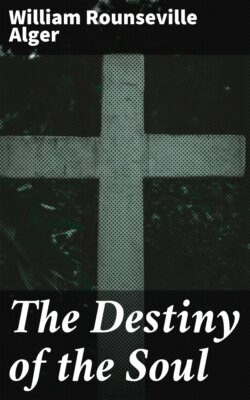Читать книгу The Destiny of the Soul - William Rounseville Alger - Страница 11
На сайте Литреса книга снята с продажи.
PART SECOND. ETHNIC THOUGHTS CONCERNING A FUTURE LIFE. CHAPTER I. BARBARIAN NOTIONS OF A FUTURE LIFE.
ОглавлениеPROCEEDING now to give an account of the fancies and opinions in regard to a future life which have been prevalent, in different ages, in various nations of the earth, it will be best to begin by presenting, in a rapid series, some sketches of the conceits of those uncivilized tribes who did not so far as our knowledge reaches possess a doctrine sufficiently distinctive and full, or important enough in its historical relations, to warrant a detailed treatment in separate chapters.
We will glance first at the negroes. According to all accounts, while there are, among the numerous tribes, diversities and degrees of superstition, there is yet, throughout the native pagan population of Africa, a marked general agreement of belief in the survival of the soul, in spectres, divination, and witchcraft; and there is a general similarity of funeral usages. Early travellers tell us that the Bushmen conceived the soul to be immortal, and as impalpable as a shadow, and that they were much afraid of the return of deceased spirits to haunt them. They were accustomed to pray to their departed countrymen not to molest them, but to stay away in quiet. They also employed exorcisers to lay these ill omened ghosts. Meiners relates of some inhabitants of the Guinea coast that their fear of ghosts and their childish credulity reached such a pitch that they threw their dead into the ocean, in the expectation of thus drowning soul and body together.
Superstitions as gross and lawless still have full sway. Wilson, whose travels and residence there for twenty years have enabled him to furnish the most reliable information, says, in his recent work,1 "A native African would as soon doubt his present as his future state of being." Every dream, every stray suggestion of the mind, is interpreted, with unquestioning credence, as a visit from the dead, a whisper from a departed soul. If a man wakes up with pains in his bones or muscles, it is because his spirit has wandered abroad in the night and been flogged by some other spirit. On certain occasions the whole community start up at midnight, with clubs, torches, and hideous yells, to drive the evil spirits out of the village. They seem to believe that the souls of dead men take rank with good or bad spirits, as they have themselves been good or bad in this life. They bury with the deceased clothing, ornaments, utensils,
1 Western Africa, ch. xii.
and statedly convey food to the grave for the use of the revisiting spirit. With the body of king Weir of the Cavalla towns, who was buried in December of 1854, in presence of several missionaries, was interred a quantity of rice, palm oil, beef, and rum: it was supposed the ghost of the sable monarch would come back and consume these articles. The African tribes, where their notions have not been modified by Christian or by Mohammedan teachings, appear to have no definite idea of a heaven or of a hell; but future reward or punishment is considered under the general conception of an association, in the disembodied state, with the benignant or with the demoniacal powers.
The New Zealanders imagine that the souls of the dead go to a place beneath the earth, called Reinga. The path to this region is a precipice close to the sea shore at the North Cape. It is said that the natives who live in the neighborhood can at night hear sounds caused by the passing of spirits thither through the air. After a great battle they are thus warned of the event long before the news can arrive by natural means.2 It is a common superstition with them that the left eye of every chief, after his death, becomes a star. The Pleiades are seven New Zealand chiefs, brothers, who were slain together in battle and are now fixed in the sky, one eye of each, in the shape of a star, being the only part of them that is visible. It has been observed that the mythological doctrine of the glittering host of heaven being an assemblage of the departed heroes of earth never received a more ingenious version.3 Certainly it is a magnificent piece of insular egotism. It is noticeable here that, in the Norse mythology, Thor, having slain Thiasse, the giant genius of winter, throws his eyes up to heaven, and they become stars. Shungie, a celebrated New Zealand king, said he had on one occasion eaten the left eye of a great chief whom he had killed in battle, for the purpose of thus increasing the glory of his own eye when it should be transferred to the firmament. Sometimes, apparently, it was thought that there was a separate immortality for each of the eyes of the dead, the left ascending to heaven as a star, the right, in the form of a spirit, taking flight for Reinga.
